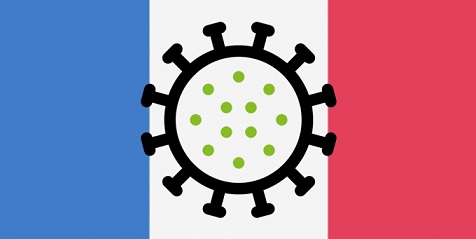COVID-19 News: Rising SARS-CoV-2 Infections In France Raise Concerns Of A Potential New Epidemic!
Nikhil Prasad Fact checked by:Thailand Medical News Team Nov 27, 2023 1 year, 4 months, 3 days, 8 hours, 3 minutes ago
COVID-19 News: In a recent health bulletin released on November 22, Santé Publique France (SPF), the French public health agency, has issued a warning regarding the resurgence of COVID-19 cases across the country. While there is currently 'no signal of concern,' the latest epidemiological indicators reveal a rising trend that demands attention.
https://www.santepubliquefrance.fr/maladies-et-traumatismes/maladies-et-infections-respiratoires/grippe/documents/bulletin-national/infections-respiratoires-aigues-grippe-bronchiolite-covid-19-.-bulletin-du-22-novembre-2023

The COVID-19 incidence rate in France, a key metric indicating the speed of the epidemic's spread, stands at 27.96 per 100,000 inhabitants nationally for the week of November 13 to 19. This represents a significant 24% increase compared to the previous week. It's crucial, however, to contextualize these figures, as the incidence rate during the peak of the pandemic was substantially higher at 500 per 100,000 inhabitants. SPF emphasizes that the current data is less reliable due to lower testing rates and the exclusion of lateral flow tests conducted in pharmacies.
According to local
COVID-19 News coverages, the eastern part of France is currently experiencing the highest incidence rates, with Bas-Rhin being the worst-affected at 111.54 per 100,000 inhabitants, marking a 34.66% week-on-week increase. Other significantly affected regions include Haut-Rhin, Moselle, Meuse, Haute-Marne, and Côte-d’Or. Even in regions with lower rates, almost every town or settlement has witnessed a rise in incidence, indicating a widespread trend.
https://www.connexionfrance.com/article/French-news/Health/New-rise-in-Covid-cases-in-France-What-do-latest-figures-show
Experts attribute this resurgence to the changing weather conditions as colder temperatures create an environment conducive to the virus's circulation. Dr Bruno Lina, a virologist based in Lyon, highlighted this correlation, stating, "It's likely that there will be a resurgence because this is directly linked to the fact that current climatic conditions favor the circulation of the SARS-CoV-2 virus."
In addition to climatic factors, concerns about new variants have also emerged. Notably, the variants BA.2.86 (Pirola) and its substrain JN.1, both subvariants of Omicron, have surfaced in recent weeks.
In fact, besides the United Kingdom, France is the second country in Europe where the BA.2.86 spawn is rising increasingly in circulation.
https://twitter.com/RajlabN/status/1728286789289533516/photo/1
JN.1 is expected to replace the previous strain EG.5 (Eris) and beco
me the dominant variant over time, according to SPF. Despite these developments, SPF's latest risk analysis indicates "no signal of concern in terms of public health" associated with this new variant.
As France braces for the potential impact of these rising cases, public health officials emphasize the importance of vigilance, adherence to safety measures, and increased testing to accurately assess the true extent of the resurgence. The nation remains cautiously optimistic, hoping that proactive measures can curb the spread and prevent a full-scale return of the pandemic. As the situation unfolds, ongoing monitoring and swift responses will be crucial to managing and mitigating the impact of any potential new epidemic on public health.
For the latest
COVID-19 News, keep on logging to Thailand Medical News.
